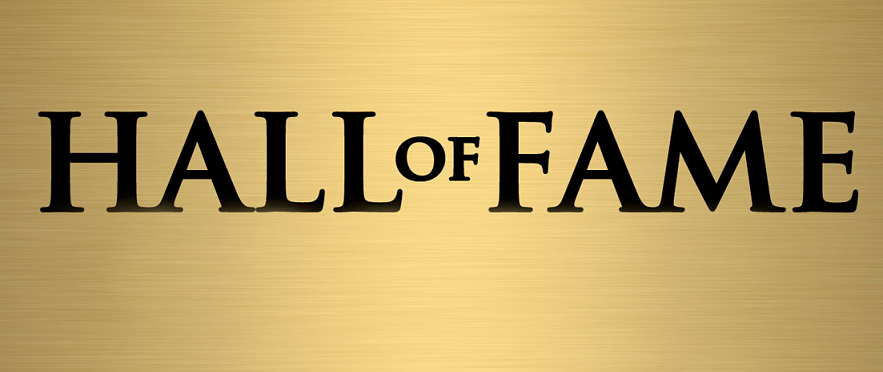
Brass band historian Tim Mutum has been asked by 4BR to curate a ‘Hall of Fame’ of players, conductors, composers, adjudicators, entrepreneurs, administrators and personalities who have helped to shape as well as drive the brass band movement from its beginning to the modern day.
Fame can be lasting and indelible or fleeting and ephemeral – from the names who appear on contest record rolls of honour to those who made contributions to greatness in other ways around the brass band globe.
Fame can be lasting and indelible or fleeting and ephemeral – from the names who appear on contest record rolls of honour to those who made contributions to greatness in other ways around the brass band globe.
The undisputed giants of Gladney, Rimmer and Mortimer will of course be included, but so too those who may not so readily be spoken of as ‘greats’ but whose contribution should without doubt be marked.
We hope you enjoy the series, which we also hope will be added to with further information about each person as we develop it.
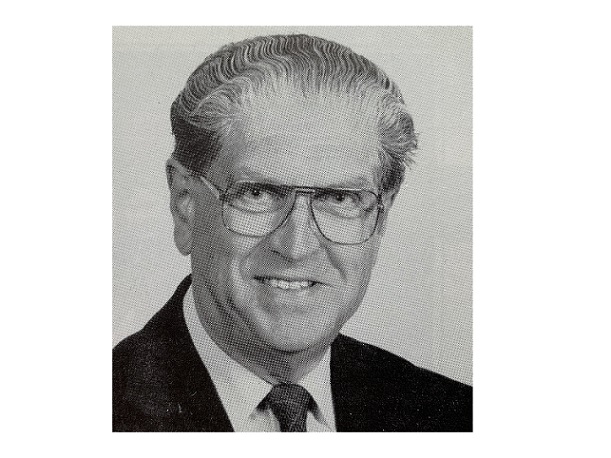
No 10: Albert Chappell (1917 - 1999)
Albert Chappell was one of the mainstay figures of the UK brass band movement in the second half of the 20th century.
His name may not adorn the record books of the major championships title winners, yet his influence in developing bands that claimed them certainly was.
Experience
Born into a musical Salvation Army family in Rugby in the Midlands, Albert followed their encouragement (both parents were trombone players) and made a concentrated study of the piano, violin and trombone, leading to diploma qualification on all three instruments including the LRAM.
Aged 16, he was solo trombone in the Coventry Salvation Army Band, considered by many to be the best outside the International Staff Band in London. Disputes eventually led to a period of bitter wrangling and the band split – one part eventually emerging to become City of Coventry Band in 1939.
During his military service from 1942 to 1947 he was a widely respected trombonist with the Royal Artillery Band, Woolwich, but also enjoyed playing in dance bands and orchestras, theatre and brass bands. It was to be invaluable musical experience.
In 1948 he returned to his musical roots and became bandmaster of City of Coventry, leading them at the Midlands Regional Championships in 1949 as well as gaining further experience conducting other bands in the region.
During his military service from 1942 to 1947 he was a widely respected trombonist with the Royal Artillery Band, Woolwich, but also enjoyed playing in dance bands and orchestras, theatre and brass bands. It was to prove to be invaluable musical experience.
After leaving in 1950 he spent time consolidating a successful teaching career – one that eventually saw him become Head of Music at Ash Green School in Warwickshire and a tutor at Coventry College of Education.
Rejuvenation
He returned to City of Coventry in 1958 taking over the mantle of a stagnated band in need of rejuvenation.
His impact was immediate; his strong work ethic, attention to detail and insistence on levels of professionalism seeing them make upwardly mobile progress; from a first win at a local Birmingham Association contest and an appearance at the British Open the following year, to qualifying for the 1964 National Finals.
They were to return to the Royal Albert Hall every year through to 1975.
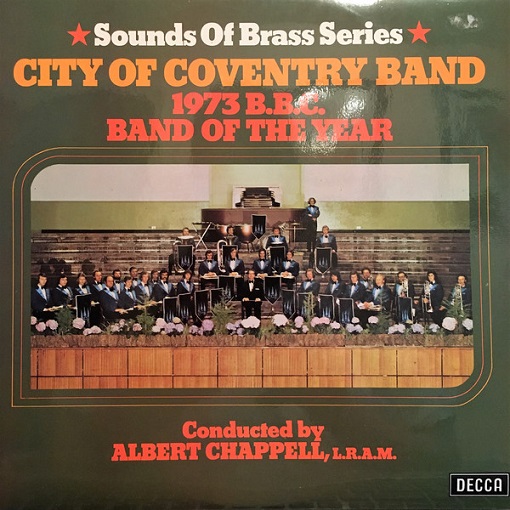
1973 BBC Band of the Year
In 1965 the band won the Edinburgh International Contest, beating the Yorkshire giants of Carlton Main and Black Dyke in the process, a significant indication of the progress made.
His band mirrored the man and the musician himself; solid, consistent and mature in musicality, his conducting style assured and compact, the gestures meaningful and deliberate, if occasionally energetic. His players always knew what was expected of them.
His band mirrored the man and the musician himself; solid, consistent and mature in musicality, his conducting style assured and compact, the gestures meaningful and deliberate, if occasionally energetic. His players always knew what was expected of them.
Elite contenders
A year later they claimed the Midlands Regional Championship title, repeating the feat in 1967.
In the October they came fifth at the Albert Hall, followed by a fourth place finish in 1968, as they cemented their place as an elite level contender for major championship honours.

Regional champions again in 1974
Although they failed to make a mark on their return to the British Open in 1969, they claimed a third Regional title in 1970, whilst in 1971, with the short-lived World Championship diluting the National Championship field, they came runner-up to Wingates Temperance.
The band also won the first BBC ‘Challenging Brass’ title in 1972 (against the likes of Black Dyke, GUS (Footwear) and Cory), held at London’s Festival Hall and went on to be proclaimed BBC ‘Band of the Year’ in 1973.
High water mark
This was to be the high water mark for the partnership – one also marked by Chappell’s broadminded approach to repertoire (they made a number of well received LP recordings) and his development of youthful talent through the City of Coventry ‘B’ Band.
The Midlands Regional title was secured once more in 1973 and retained 1974, and a top-six finish claimed at the British Open in the same year.
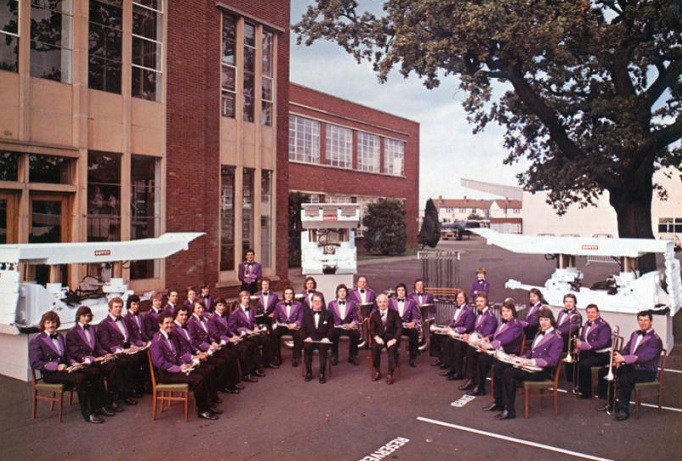
Albert Chappell led the emerging Desford Colliery Band for two years
The partnership came to an end in 1975, but Albert Chappell soon made another mark in leading the emerging Desford Colliery to the Midlands Regional title in 1976 and 1977 – the latter a ‘double’ in winning the National Mineworkers Championship title for the first time in the band’s history.
Cornwall
On retiring to Camborne in Cornwall with his wife Eileen in July 1978, he eventually took over the direction of St Austell Band.
There he enjoyed considerable success on the contest stage; winning the popular Yeovil Entertainment title twice, the famous Bugle contest and the Pontins title, and becoming a great influence on the Cornish banding scene.
He made his last contest appearance with St Austell in 1984.
There he enjoyed considerable success on the contest stage; winning the popular Yeovil Entertainment title twice, the famous Bugle contest and the Pontins title, and becoming a great influence on the Cornish banding scene.
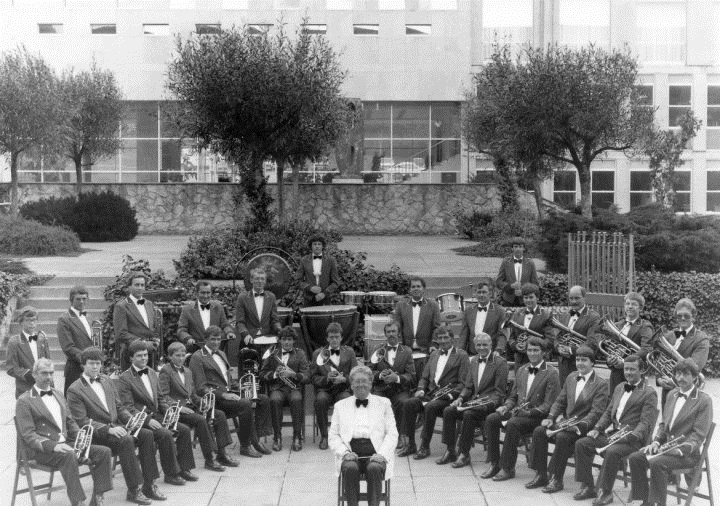
At the helm of St Austell Band
With a richly deserved reputation as an inspirational teacher of brass he first conducted the Cornish Youth Band in 1976 and was such a success that he was invited back the following year and again in 1979.
It was an association that was to last until the year of his death – seeing him become a proud President as well as leading them to claim the County Youth Band Section award at the 1983 National Festival of Youth at the Royal Festival Hall in London.
Such was the regard he was held in that an annual award is now given in his name.
In a neat quirk of fate he adjudicated alongside William Relton and John Maundell when City of Coventry won the British Open title in 1981.
Adjudicator
Albert Chappell was also highly respected as an adjudicator – first entering the tent in 1965 and eventually judging at all levels, including the National Finals at the Royal Albert Hall, the British Open, European Championship, Granada Band of the Year and Brass in Concert.
In a neat quirk of fate he adjudicated alongside William Relton and John Maundell when City of Coventry won the British Open title in 1981.
Albert Chappell is amongst those who do not proclaim their virtues by self blazoning. His deeds and the quality of them, are sufficient to proclaim the worth of the large contribution which he has made
On being announced as the recipient of the 1974 Iles Medal, the British Bandsman stated that “…he shares the responsibility of all those who teach. Those who come to learn from Albert Chappell are amongst the fortunate ones.”
They added: “…and in the nature of the man it will be modestly received, for Albert Chappell is amongst those who do not proclaim their virtues by self blazoning. His deeds and the quality of them, are sufficient to proclaim the worth of the large contribution which he has made.”
After his wife’s death in 1992 and his own declining health he eventually returned to live near his daughter in Warwick.
He passed away on 19th November 1999.
Tim Mutum
4BR Hall of Fame: No.1: Jack Atherton
https://www.4barsrest.com/articles/2019/1832.asp
4BR Hall of Fame: No.2: Albert Baile
https://www.4barsrest.com/articles/2019/1836.asp
4BR Hall of Fame: No.3: Stanley Boddington
https://www.4barsrest.com/articles/2019/1842.asp
4BR Hall of Fame: No.4: Bram Gay
https://www.4barsrest.com/articles/2020/1848.asp
4BR Hall of Fame: No.5: Leonard Lamb
https://www.4barsrest.com/articles/2020/1855.asp
4BR Hall of Fame: No.6: Arthur Stender
https://www.4barsrest.com/articles/2020/1866.asp
4BR Hall of Fame: No.7: Violet Brand
https://www.4barsrest.com/articles/2020/1871.asp
4BR Hall of Fame: No.8: Eric Bravington
https://www.4barsrest.com/articles/2020/1875.asp
4BR Hall of Fame: No.9: Norman Ashcroft
https://www.4barsrest.com/articles/2020/1879.asp













